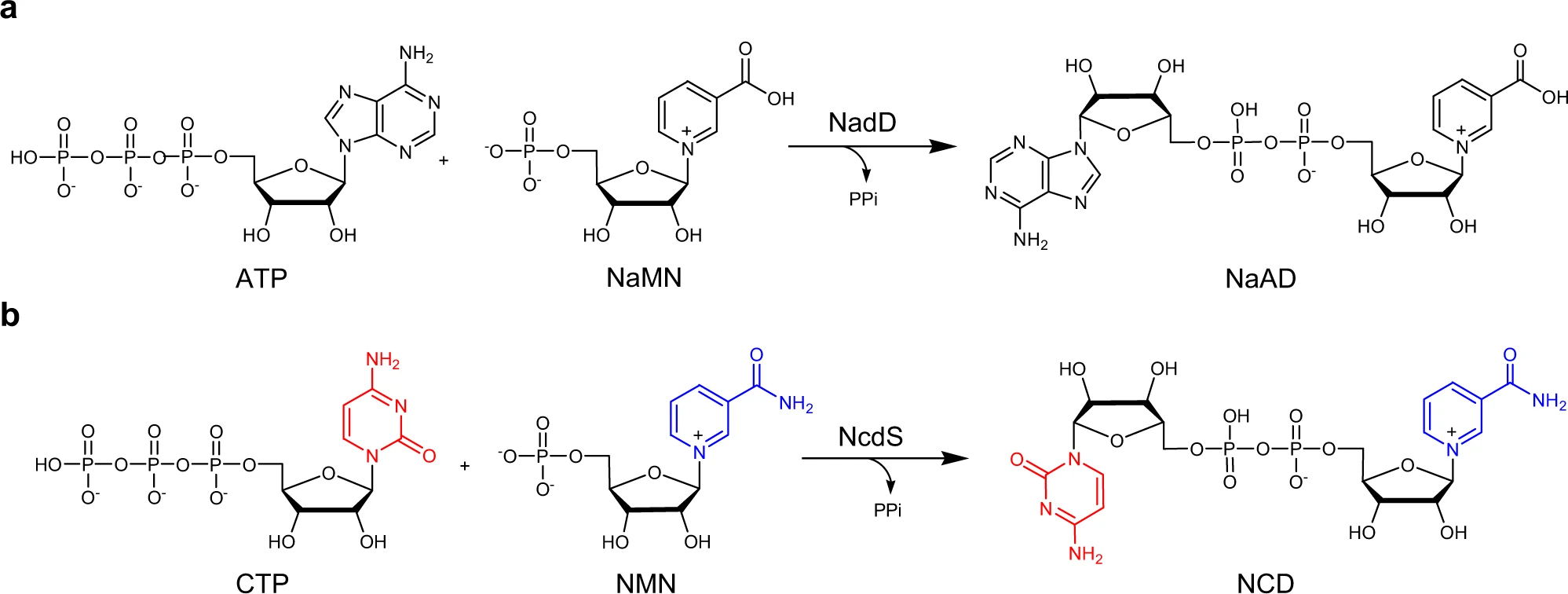Our company is thrilled to offer cutting-edge services in incorporating non-natural cofactors to unlock novel functions in enzyme design. With our expertise in synthetic biology and protein engineering, we provide comprehensive solutions to engineer enzymes capable of utilizing non-natural cofactors, enabling groundbreaking enzymatic functions and expanding the possibilities of biocatalysis.
 Fig. 1. Structures and enzymes for cofactor biosynthesis. (Wang, X.; et al. 2021)
Fig. 1. Structures and enzymes for cofactor biosynthesis. (Wang, X.; et al. 2021)
Our Services
- Non-Natural Cofactor Selection
We work closely with you to select appropriate non-natural cofactors that align with your desired enzymatic function and application. These non-natural cofactors can be chemically modified versions of existing cofactors or entirely new chemical entities, offering expanded reactivity and catalytic potential.
- Rational Design Strategies
Our team of experts employs rational design strategies to engineer enzymes capable of incorporating non-natural cofactors. By analyzing the enzyme's structure and binding sites, we identify key regions for modification or create new binding pockets to accommodate the non-natural cofactors. This rational design approach ensures precision and efficiency in modifying the enzyme's active site for enhanced cofactor utilization.
- Computational Modeling and Simulation
We utilize advanced computational tools and techniques to simulate the interactions between enzymes and non-natural cofactors. Molecular dynamics simulations and docking studies allow us to predict the binding affinity, stability, and conformational changes associated with the incorporation of non-natural cofactors. This computational analysis guides our design process, accelerating the discovery of successful enzyme-cofactor combinations.
- Enzyme-Cofactor Compatibility Assessment
We conduct thorough compatibility assessments to ensure the successful incorporation of non-natural cofactors into the engineered enzymes. Through biochemical and biophysical analyses, we evaluate the binding kinetics, affinity, and specificity of the enzyme-cofactor interaction. This assessment provides valuable insights into the feasibility and effectiveness of the designed modifications.
- Synthetic Pathway Design
In cases where the non-natural cofactors require synthesis or biosynthetic pathways, we offer expertise in synthetic biology and metabolic engineering. Our team designs and constructs synthetic pathways for the production of non-natural cofactors, ensuring their availability for enzyme incorporation. This integrated approach covers both the enzyme engineering and cofactor production aspects of the project.
- Enzyme Expression and Characterization
We optimize the expression of the engineered enzymes using suitable host systems and purification techniques. Through comprehensive biochemical and biophysical characterization, we assess the enzymatic activity, stability, and specificity in the presence of non-natural cofactors. This characterization provides a detailed understanding of the engineered enzymes and their performance.
- Optimization and Iterative Design
We offer iterative design cycles and optimization services to fine-tune the engineered enzymes for optimal performance and catalytic efficiency. By incorporating your feedback and insights, we iteratively refine the enzyme-cofactor interaction, enhancing the desired novel functions and optimizing the enzymatic activity for your specific application.
- Documentation and Reporting
We provide detailed documentation and reports that outline the design strategies, experimental procedures, and results obtained during the incorporation of non-natural cofactors. This documentation ensures transparency, facilitates future reference, and supports further optimization or application of the engineered enzymes.
Applications
- Biocatalysis and Chemical Synthesis: Incorporating non-natural cofactors can enhance the catalytic efficiency and expand the substrate specificity of enzymes, making them powerful tools for biocatalysis. Our services enable the design of enzymes that can perform complex chemical transformations, including selective oxidation, reduction, and functional group modifications. These engineered enzymes can be applied in the synthesis of pharmaceuticals, fine chemicals, and specialty compounds.
- Sustainable Manufacturing: The use of enzymes with non-natural cofactors can contribute to sustainable manufacturing processes. By enabling enzymatic reactions that replace traditional chemical methods, our services support eco-friendly and cost-effective manufacturing approaches. This can lead to reduced energy consumption, minimized waste generation, and improved process efficiency in industries such as pharmaceuticals, food production, and biofuels.
- Biotechnology and Biomaterials: Incorporating non-natural cofactors expands the enzymatic toolkit for biotechnology applications. Engineered enzymes can be utilized in the production of bio-based materials, including bioplastics, biofuels, and biocompatible polymers. The introduction of non-natural cofactors can enhance the enzymatic synthesis of these materials, enabling tailored properties and improved sustainability.
- Pharmaceutical Development: Our services offer opportunities for the development of novel enzymatic pathways and the synthesis of pharmaceutical intermediates. Enzymes with non-natural cofactors can enable the production of chiral compounds, which are crucial in pharmaceutical synthesis. These engineered enzymes can facilitate the synthesis of complex drug molecules, accelerate drug discovery, and provide more efficient routes for pharmaceutical production.
- Environmental Remediation: Enzymes engineered with non-natural cofactors can play a vital role in environmental remediation processes. They can be designed to degrade or transform specific pollutants, such as pesticides, toxins, or industrial waste compounds, into less harmful forms. This can contribute to the cleanup of contaminated sites, water purification, and environmental sustainability efforts.
- Diagnostic and Biomedical Applications: The incorporation of non-natural cofactors can expand the capabilities of enzymes for diagnostic and biomedical applications. Engineered enzymes can be designed to detect specific biomarkers, facilitate medical imaging, or enable targeted drug delivery. These applications have the potential to revolutionize disease diagnosis, personalized medicine, and therapeutic approaches.
- Biosensors and Biodevices: Enzymes with non-natural cofactors can be integrated into biosensors and biodevices for various analytical and detection purposes. These engineered enzymes can enhance the sensitivity, selectivity, and response time of biosensors, enabling rapid and accurate detection of target analytes. They can be used in environmental monitoring, food safety, and medical diagnostics.
We are committed to delivering high-quality, customized solutions that align with your specific requirements. Our collaborative approach, state-of-the-art technologies, and commitment to successful outcomes allow us to help you expand the catalytic capabilities of enzymes and develop innovative enzymatic reactions. Please contact us and start our cooperation.
Reference
- Wang, X.; et al. Creating enzymes and self-sufficient cells for biosynthesis of the non-natural cofactor nicotinamide cytosine dinucleotide. Nature Communications. 2021. 12(1): p. 2116.

































 Fig. 1. Structures and enzymes for cofactor biosynthesis. (Wang, X.; et al. 2021)
Fig. 1. Structures and enzymes for cofactor biosynthesis. (Wang, X.; et al. 2021)